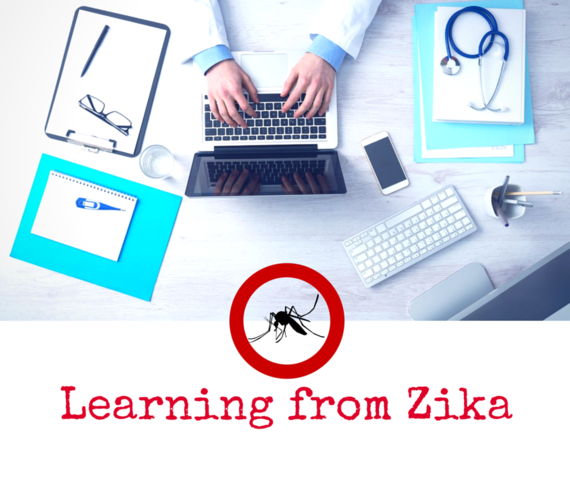Everything seems scarier during the dark of night than in the light of day.
That is a likely explanation for why the public hit the panic button when the Zika virus made headlines this year. Zika, which is currently under intense investigation because of concerns that it might cause pregnant women to miscarry or deliver babies with abnormally small brains, is spreading wildly in Latin America, with four million cases expected within the next year. It was declared an international public health emergency by the World Health Organization this past winter and in the last several months there have been Zika virus infections diagnosed in the U.S., mainly in travelers from out of the country.
Zika poses a real, but relatively small, risk to most Americans. But because the risk itself cannot be quantified precisely, and no doctor can assure you with 100 percent certainty that you will be fine, we remain concerned, especially as the summer months approach and mosquitoes -- major Zika transmitters -- are out in large numbers.
Clearly, pregnant women should avoid traveling to countries experiencing Zika outbreaks. If for some reason they must travel to those locales, it is critical that they minimize outdoor activity, use insect repellents that are safe for pregnant women and consult with physicians if they experience the virus symptoms, which include fever, rash, headache, joint pain and conjunctivitis.
As doctors and researchers learn more about Zika, the ever-changing information is causing further alarm. A few months ago, the Centers for Disease Control and Prevention (CDC) estimated that blood was free of infection one week after contracting Zika, an estimate that later revised to one month, and, as of today, the website says eight weeks. The Zika virus, which can be transmitted sexually as well as through mosquito bites, persists in semen longer than in blood. And although we know that we must watch out if men contract the virus, we do not know how many Zika infections are transmitted through semen rather than mosquitoes. It's thought to be very few, but the true number of cases that are sexually transmitted is simply uncertain.
So if the medical experts are still learning about the virus, how is the public supposed to know how to react? This is the point where well-educated health care professionals play a vital role.
People need to remember that there are no guarantees in life and know that health care professionals are there to help. Every day we all make a million decisions based on uncertainty and incomplete information. We balance the risks and benefits and take the plunge, making the choice that we feel is best for each of us with the information available at the time.
Take the popular WAZE app. Which road to take to avoid traffic can be a moving target, but we look at WAZE and we go for it. WAZE crowdsources data from multiple sources and computes the average time it will take to get from point A to point B, keeping track of the various factors and information at any given point. It suggests the best solution based on what is known. Yet, by the time you're en route, there might be a new accident or road hazard that hasn't yet been factored in to the system. It is an apt metaphor for what health care professionals can do for you in a time of public health crisis.
As president of a university that is a leading national educator of health care professionals, I can tell you that we train our students to acquire the skills necessary to absorb all the scientific information that is available, and then translate it into solutions to help patients navigate their way through a world filled with uncertainty. Evaluating the risk-benefit ratio of any intervention or behavior is a technique that all health care professionals learn during training, and one that everyone needs to master.
Unlike the news media, whose job it is to report all the information that is known at press time, the job of health care professionals is to analyze that information and help individual patients decide what course of action is right for themselves and their families. Each of us has our own tolerance for risk and there is no single answer that is right for everyone.
But even with the best information that we have available, there are questions to which we do not have adequate data to answer. Whether to travel to Zika-infected areas -- such as the summer Olympics in Rio -- is one of them. For women who are pregnant, the answer seems clear: Skip it. For the rest of us, the "correct" answer is unknown. Because although our personal risk may be low, it is possible that we will transmit the disease to others on our return.
Uncertainty will always be part of life and there are so few absolutes. And yet, everyone should have a trusted and competent health care professional to help find solutions. It may be scary in the dark, but your doctor can light a candle.
